人教版九年级的英语Unit10知识点复习.doc
Unit10知识重点总结 人教版新目标 英语九年级全册
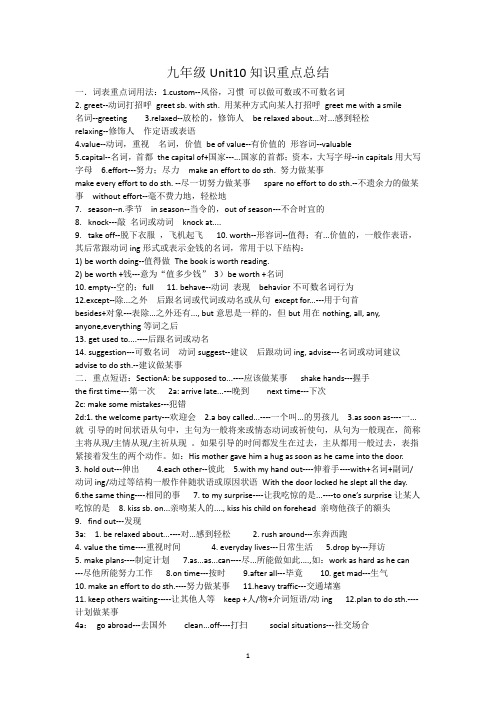
九年级Unit10知识重点总结一.词表重点词用法:1.custom--风俗,习惯可以做可数或不可数名词2.greet--动词打招呼greet sb. with sth. 用某种方式向某人打招呼greet me with a smile名词--greeting 3.relaxed--放松的,修饰人be relaxed about...对...感到轻松relaxing--修饰人作定语或表语4.value--动词,重视名词,价值be of value--有价值的形容词--valuable5.capital--名词,首都the capital of+国家---...国家的首都;资本,大写字母--in capitals用大写字母6.effort---努力;尽力make an effort to do sth. 努力做某事make every effort to do sth. --尽一切努力做某事spare no effort to do sth.--不遗余力的做某事without effort--毫不费力地,轻松地7.season--n.季节in season--当令的,out of season---不合时宜的8.knock---敲名词或动词knock at....9.take off--脱下衣服,飞机起飞10. worth--形容词--值得;有...价值的,一般作表语,其后常跟动词ing形式或表示金钱的名词,常用于以下结构:1)be worth doing--值得做The book is worth reading.2)be worth +钱---意为“值多少钱”3)be worth +名词10.empty--空的;full 11. behave--动词表现behavior不可数名词行为12.except--除...之外后跟名词或代词或动名或从句except for...---用于句首besides+对象---表除...之外还有..., but意思是一样的,但but用在nothing, all, any, anyone,everything等词之后13.get used to....----后跟名词或动名14.suggestion---可数名词动词suggest--建议后跟动词ing, advise---名词或动词建议advise to do sth.--建议做某事二.重点短语:SectionA: be supposed to...----应该做某事shake hands---握手the first time---第一次2a: arrive late...---晚到next time---下次2c: make some mistakes---犯错2d:1. the welcome party---欢迎会 2.a boy called...----一个叫...的男孩儿 3.as soon as----一...就引导的时间状语从句中,主句为一般将来或情态动词或祈使句,从句为一般现在,简称主将从现/主情从现/主祈从现。
人教版九年级英语全册Unit10知识点
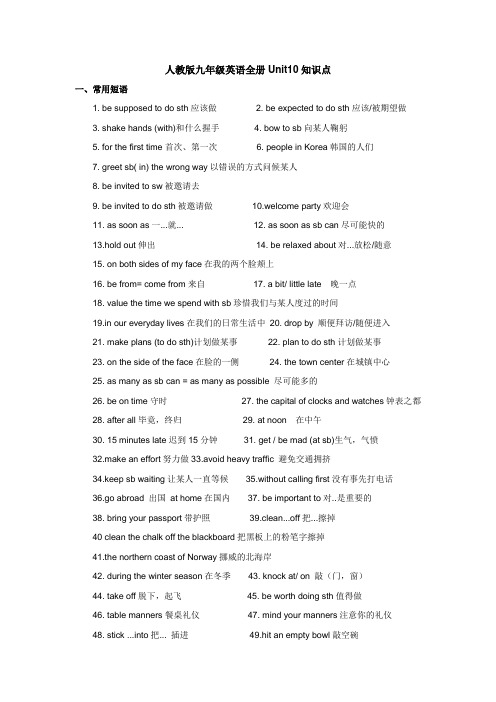
人教版九年级英语全册Unit10知识点一、常用短语1. be supposed to do sth应该做2. be expected to do sth应该/被期望做3. shake hands (with)和什么握手4. bow to sb向某人鞠躬5. for the first time首次、第一次6. people in Korea韩国的人们7. greet sb( in) the wrong way以错误的方式问候某人8. be invited to sw被邀请去9. be invited to do sth被邀请做10.welcome party欢迎会11. as soon as一...就... 12. as soon as sb can尽可能快的13.hold out伸出14. be relaxed about对...放松/随意15. on both sides of my face在我的两个脸颊上16. be from= come from来自17. a bit/ little late 晚一点18. value the time we spend with sb珍惜我们与某人度过的时间19.in our everyday lives在我们的日常生活中20. drop by 顺便拜访/随便进入21. make plans (to do sth)计划做某事22. plan to do sth计划做某事23. on the side of the face在脸的一侧24. the town center在城镇中心25. as many as sb can = as many as possible 尽可能多的26. be on time守时27. the capital of clocks and watches钟表之都28. after all毕竟,终归29. at noon 在中午30. 15 minutes late迟到15分钟31. get / be mad (at sb)生气,气愤32.make an effort努力做33.avoid heavy traffic 避免交通拥挤34.keep sb waiting让某人一直等候35.without calling first没有事先打电话36.go abroad 出国at home在国内37. be important to对..是重要的38. bring your passport带护照39.clean...off把...擦掉40 clean the chalk off the blackboard把黑板上的粉笔字擦掉41.the northern coast of Norway挪威的北海岸42. during the winter season在冬季43. knock at/ on 敲(门,窗)44. take off脱下,起飞45. be worth doing sth值得做46. table manners餐桌礼仪47. mind your manners注意你的礼仪48. stick ...into把... 插进49.hit an empty bowl敲空碗50. point at指着, point to指向(侧重方向51. at the table在餐桌旁52 at table在吃饭53.basic table manners基本的餐桌礼仪54. my biggest challenge我最大的挑战55. on my student exchange program在我的交换生生56.there is no reason to do sth没原因做57. go out of one’s way (to do sth.)特地做某事, 格外努力做58.make sb feel at home使某人感到宾至如归59. a teenage granddaughter一个十几岁的(外)孙女60. talk to sb in French用法语和...交谈61.be comfortable doing舒服/轻松做某事62.behave well/ badly/ politely举止好63. behave oneself举止规矩64. as you can imagine正如你想象的那样65. be different from与...不同66.be / get used to sth习惯于某事be / get used to doing sth.习惯于做某事67. gradually get used to sth逐渐习惯某事68. cut it up把它切开69. eat it with a fork用叉子吃它70.put your elbows on the table把肘部放在桌子上71. have a safe trip一路平安,旅途愉快72. show up 出席,露面,到场二、短语用法集锦1.(1)suppose:猜想;假设suppose that表示“猜测;假设”,that可省例:I suppose he is a student.(2)be supposed to do sth被期望做某事,应该做某事。
人教版九年级全一册英语Unit10重点语法知识点总结
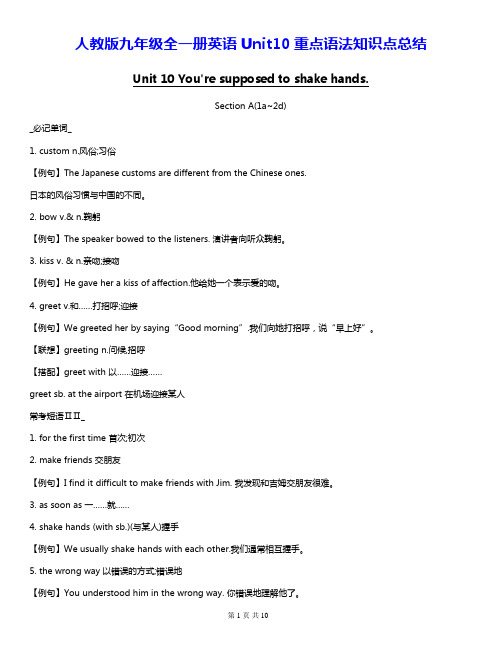
人教版九年级全一册英语Unit10重点语法知识点总结Unit 10 You're supposed to shake hands.Section A(1a~2d)_必记单词_1. custom n.风俗;习俗【例句】The Japanese customs are different from the Chinese ones.日本的风俗习惯与中国的不同。
2. bow v.& n.鞠躬【例句】The speaker bowed to the listeners. 演讲者向听众鞠躬。
3. kiss v. & n.亲吻;接吻【例句】He gave her a kiss of affection.他给她一个表示爱的吻。
4. greet v.和……打招呼;迎接【例句】We greeted her by saying“Good morning”.我们向她打招呼,说“早上好”。
【联想】greeting n.问候,招呼【搭配】greet with 以……迎接……greet sb. at the airport 在机场迎接某人常考短语ⅡⅡ_1. for the first time 首次;初次2. make friends 交朋友【例句】I find it difficult to make friends with Jim. 我发现和吉姆交朋友很难。
3. as soon as 一……就……4. shake hands (with sb.)(与某人)握手【例句】We usually shake hands with each other.我们通常相互握手。
5. the wrong way 以错误的方式;错误地【例句】You understood him in the wrong way. 你错误地理解他了。
6. hold out 伸出(手等)7. greet each other 互相问候8. to one’s surprise 令某人惊讶的是经典句型ⅢⅡ1. That's how people in Japan are expected to greet each other.那就是在日本人们互相问候的方式。
人教版九年级英语上册unit10基础知识复习及训练(含答案)
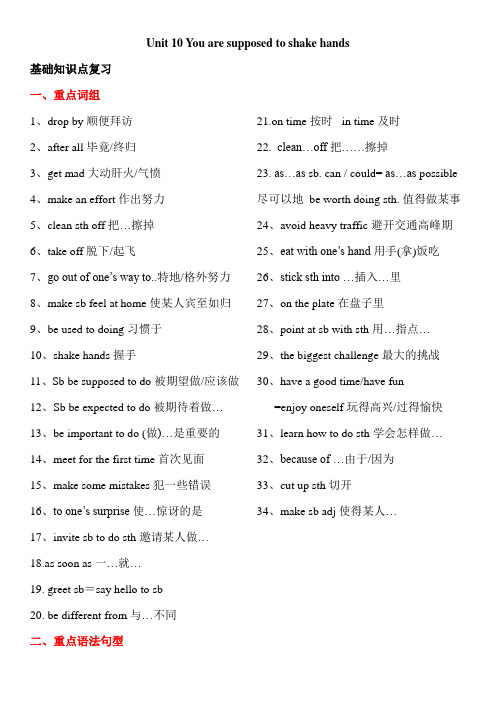
Unit 10 You are supposed to shake hands 基础知识点复习一、重点词组1、drop by顺便拜访2、after all毕竟/终归3、get mad大动肝火/气愤4、make an effort作出努力5、clean sth off把…擦掉6、take off脱下/起飞7、go out of one’s way to..特地/格外努力8、make sb feel at home使某人宾至如归9、be used to doing习惯于10、shake hands握手11、Sb be supposed to do被期望做/应该做12、Sb be expected to do被期待着做…13、be important to do (做)…是重要的14、meet for the first time首次见面15、make some mistakes犯一些错误16、to one’s surprise使…惊讶的是17、invite sb to do sth邀请某人做…18.as soon as一…就…19. greet sb=say hello to sb20. be different from 与…不同21.on time 按时 in time及时22. clean…off把……擦掉23. as…as sb. can / could= as…as possible 尽可以地 be worth doing sth. 值得做某事24、avoid heavy traffic避开交通高峰期25、eat with one’s hand用手(拿)饭吃26、stick sth into …插入…里27、on the plate在盘子里28、point at sb with sth用…指点…29、the biggest challenge最大的挑战30、have a good time/have fun=enjoy oneself玩得高兴/过得愉快31、learn how to do sth学会怎样做…32、because of …由于/因为33、cut up sth切开34、make sb adj使得某人…二、重点语法句型1、be supposed to do=should do sth应该,被期望(1)用来表示被要求,希望做某事,含有必须、应该或理应做某事(2)时态、人称、和句式变化在be动词上体现。
人教版九年级英语第十单元知识点总结(推荐文档).doc
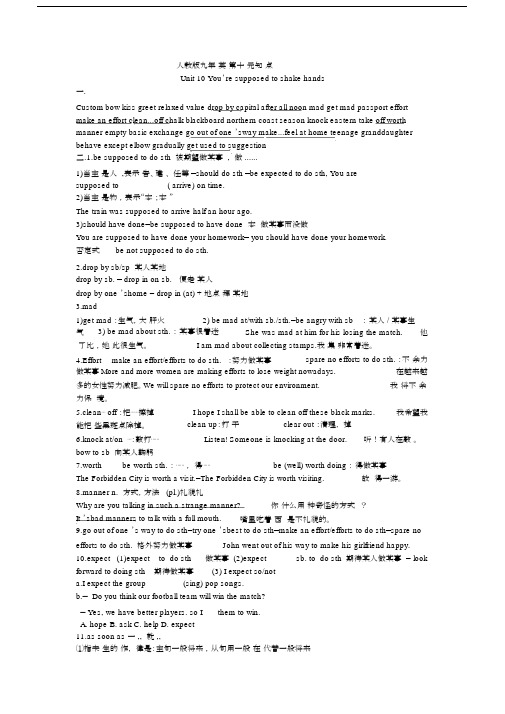
人教版九年英第十元知点Unit 10 You’re supposed to shake hands一.Custom bow kiss greet relaxed value drop by capital after all noon mad get mad passport effort make an effort clean...off chalk blackboard northern coast season knock eastern take off worth manner empty basic exchange go out of one ’sway make...feel at home teenage granddaughter behave except elbow gradually get used to suggestion二.1.be supposed to do sth 被期望做某事 ,做 ......1)当主是人 ,表示告、建、任等 =should do sth =be expected to do sth, You aresupposed to___________( arrive) on time.2)当主是物,表示“本;本”The train was supposed to arrive half an hour ago.3)should have done=be supposed to have done 本做某事而没做You are supposed to have done your homework= you should have done your homework.否定式be not supposed to do sth.2.drop by sb/sp 某人某地drop by sb. = drop in on sb. 便走某人drop by one ’shome = drop in (at) + 地点拜某地3.mad1)get mad :生气,大肝火2) be mad at/with sb./sth.=be angry with sb :某人 / 某事生气3) be mad about sth. :某事很着迷She was mad at him for his losing the match. 他了比,她此很生气。
人教版九年级全一册英语Unit10单元语法知识点总结

人教版九年级全一册英语Unit10单元语法知识点总结本单元重点短语的具体用法1. be supposed to do sth:表示“应该做某事”,例如:You are supposed to finish your homework before playing games.(你应该在玩游戏之前完成作业。
)2. be expected to do sth:意思是“应该/被期望做某事”,如:Students are expected to obey the school rules.(学生应该遵守校规。
)3. shake hands (with…):用于“(和……)握手”,比如:He shook hands with the guest politely.(他礼貌地和客人握手。
)4. bow to sb:意为“向某人鞠躬”,例如:We should bow to the old.(我们应该向老人鞠躬。
)5. for the first time:表示“首次,第一次”,如:I saw the sea for the first time.(我第一次看到了大海。
)6. people in Korea:指“韩国的人们”,例如:People in Korea like to eat kimchi.(韩国的人们喜欢吃泡菜。
)7. greet sb. (in) the wrong way:意思是“以错误的方式问候某人”,例如:You shouldn't greet others in the wrong way.(你不应该以错误的方式问候他人。
)8. be invited to sw.:表示“被邀请去……”,例如:I was invited to the party.(我被邀请参加了聚会。
)9. be invited to do sth.:意思是“被邀请做……”,如:She was invited to speak at the conference.(她被邀请在会议上发言。
人教版九年级英语Unit10知识点总结

人教版九年级英语Unit10《You're supposed to shake hands.》知识点【短语归纳】1.be supposed to do=be expected to do=should do被期望做,应该expect/wish/hope to do希望/盼望做某事expect/wish/hope + that 从句expect/wish sb. to do2. shake hands 握手3. for the first time 第一次4. table manners 餐桌礼仪5. drop by/in=come over 偶然拜访,顺便拜访dropped droppingrain drop 雨滴 a drop of water 一滴水6. after all 毕竟,终究7. be on time 准时in time 及时第 1 页共13 页By the time I got to school, the teacher had begun to have class. By the end of last term, we had learned 3000 words.at times=from time to time=sometimes=once in a while 有时sometimes 有时some times 几次sometime 某时some time 一段时间for the first time第一次8. (in)the wrong way 以错误的方式(in)the right way 以正确的方式9. be relaxed about 对……比较随意be serious about对……是认真的be worried about对……感到担忧的be anxious about对……感到焦虑的be nervous about对……感到紧张的be excited about 对…感到兴奋地be careful about10. a bit/a little/a little bit/kind of+ adj./adv. 一点,几分第 2 页共13 页a little/a bit of + Ua few+Cs11. He should have told me about it. 他本应该把这件事告诉我。
人教版九年级英语unit10知识总结
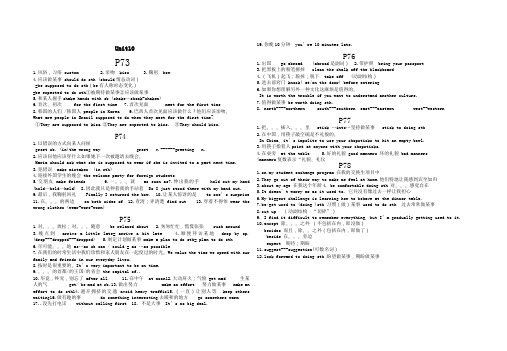
Unit10P731.风俗,习俗 custom2.亲吻 kiss3.鞠躬 bow4.应该做某事 should do sth (should 情态动词) =be supposed to do sth (be 有人称时态变化)=be expected to do sth①被期待做某事②应该做某事5.和某人握手shake hands with sb (shake —shook-shaken)6.首次、初次 for the first time7.首次见面 meet for the first time8.韩国的人们 /韩国人 people in Korea 9.巴西人首次见面应该做什么?他们应该亲吻。
What are people in Brazil supposed to do when they meet for the first time? ①They are supposed to kiss.②They are expected to kiss. ③They should kiss.P741.以错误的方式向某人问候greet sb. (in)the wrong way greet v.------greeting n. 2.应该问他应该穿什么如果她下一次被邀请去晚会。
Maria should ask what she is supposed to wear if she is invited to a part next time. 3.犯错误 make mistakes (in sth)4.迎接外国学生的晚会 the welcome party for foreign students5.交朋友 make friends6.一。
就 as soon as7.伸出我的手 hold out my hand(hold —held —held) 8.因此我只是伸着我的手站着 So I just stood there with my hand out.9.最后,我鞠躬回礼 Finally I returned the bow. 10.让某人惊讶的是 to one’s surprise11.在。
人教版英语九年级全册单元unit10知识点+测试卷+思维导图

人教版英语九年级全册单元unit10知识点+测试卷+思维导图Unit 10 You’re supposed to shake hands.1.重点词汇:capital, noon, passport, chalk, blackboard, coast, season, manner, suggestion, kiss, greet, value, knock, exchange, behave, worth, empty...2. 短语归纳:1. be supposed to 应该2. shake hands 握手3. the welcome party 欢迎会4. make friends 交朋友5. as soon as 一……就……6. to one’s surprise 使某人惊讶的是7. everyday lives 日常生活8. drop by 顺便访问;随便进入9. after all 毕竟;终究10. make an effort 付出努力11. at the table 在桌旁12. make...feel at home 使(某人)感到宾至如归13. be/get used to (doing) sth 习惯于做某事14. look forward to doing sth 期盼着做某事15. show up 出现3. 必背典句:1. -What are you supposed to do when you meet someone for the first time? 当你第一次见某人时,你应该做什么?-You’re supposed to shake hands. 你应该握手。
2. -Am I supposed to wear jeans? 我应该穿牛仔裤吗?-No, you’re expected to wear a suit and tie. 不,你应该穿西装打领带。
人教版英语九年级知识点总结Unit10
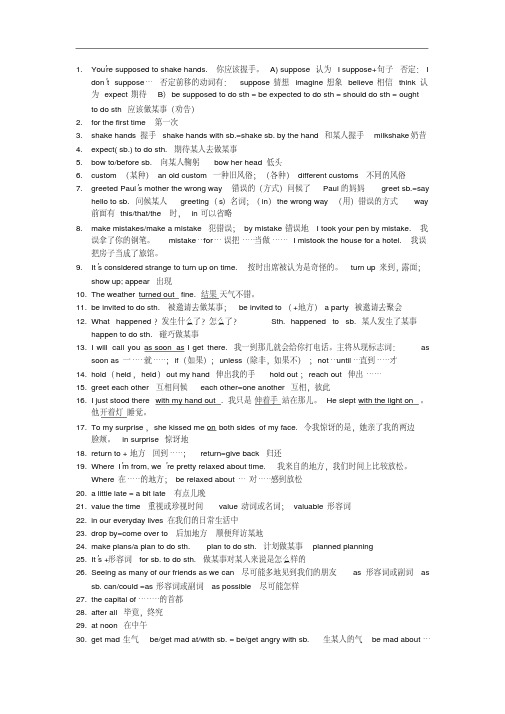
1.You’re supposed to shake hands. 你应该握手。
A) suppose 认为I suppose+句子否定:Idon’t suppose…否定前移的动词有:suppose猜想imagine想象believe相信think认为expect期待B)be supposed to do sth = be expected to do sth = should do sth = ought to do sth 应该做某事(劝告)2.for the first time 第一次3.shake hands 握手shake hands with sb.=shake sb. by the hand 和某人握手milkshake奶昔4.expect( sb.) to do sth. 期待某人去做某事5.bow to/before sb. 向某人鞠躬bow her head低头6.custom (某种)an old custom 一种旧风俗;(各种)different customs 不同的风俗7.greeted Paul’s mother the wrong way 错误的(方式)问候了Paul的妈妈greet sb.=sayhello to sb. 问候某人greeting(s)名词;(in)the wrong way (用)错误的方式way 前面有this/that/the时,in可以省略8.make mistakes/make a mistake 犯错误;by mistake错误地I took your pen by mistake. 我误拿了你的钢笔。
mistake…for…误把……当做……I mistook the house for a hotel. 我误把房子当成了旅馆。
9.It’s considered strange to turn up on time. 按时出席被认为是奇怪的。
人教版九年级英语unit10知识点

人教版九年级英语unit10知识点人教版九年级英语unit10知识1知识梳理【重点】besupposedtodosth应该做…beexpectedtodosth.应该/被期望做…shakehands(with…)(和…)握手bowtosb.向某人鞠躬forthefirsttime首次,第一次peopleinKorea韩国的人们greetsb.(in)thewrongway以错误的方式问候某人beinvitedtosw.被邀请去…...assoonas一…就…(引导时间状从)assoonassbcan尽可能快的......holdout(myhands)伸出(我的手)onbothsidesofmyface在我的两个脸颊上berelaxedabout对…放松/随意abit/littlelate晚一点valuethetimewespendwithsb珍惜我们与某人度过的时间19.inoureverydaylives在我们的日常生活中dropby顺便,随便进入makeplans(todosth.)计划做某事plantodosth.计划做某事onthesideoftheface在脸的一侧thetowncenter在城镇中心asmanyassbcan=asmanyaspossible尽可能多的…beontime守时thecapitalofclocksandwatches钟表之都afterall毕竟,终归atnoon在中午15minuteslate迟到15分钟【重点句型】Heshouldhavetoldmeaboutit.他本应该把这件事告诉我。
WhereI’mfrom,we’reprettyrelaxedabouttime.我所在的地方,对时间是相当宽松的。
Weoftenjustdropbyourfriends’homes.我们时常去朋友家拜访。
Oftenwejustwalkaroundthetowncenter,seeingasmanyofourfriendsaswecan.我们经常走遍市中心,看尽可能多的朋友。
人教版九年级英语Unit 10知识点总结

九年级英语Unit 10 You’re supposed to shake hands 讲义一、词性转换Section A1. greet → (n.) greeting2. relaxed → (v.) relax3. value → (adj.) valuable4. mad → (n.) madness5. northern → (n.) north6. eastern – (n.) eastSection B7. basic → (n) base8. gradually→ (adj.) gradual9. suggestion → (v.) suggest二短语归纳1. shake hands 握手2. for the first time 第一次;首次3. be expected to 被期望4. arrive at 到达5. make mistakes 犯错误6. as soon as 一……就……7. hold out 伸出8. greet each other 相互打招呼9. to one’s surprise 使某人吃惊的是10. on both sides of 在……的两边11. find out 查明;弄清12. everyday lives 日常生活13. drop by 顺便访问;随便进入14. make plans to do sth. 计划做某事15. on time 准时16. after all 毕竟;终归17. get mad 大动肝火;气愤18. make an effort 作出努力19. no big deal 没什么大事20. clean…off 把……擦掉21. take of 脱下(衣服);(飞机等)起飞22. point at 指向;对准23. student exchange program交换生项目24. go out of one’s way 特地;格外努力25. make…feel at home 使(某人)感到宾至如归26. because of 由于27. cut up 切碎28. get used to 习惯于29. be excited about 对……感到兴奋30. look forward to doing sth.盼望做某事31. show up 出现三.句型集萃1. be supposed to do sth.应该做某事2. be expected to do sth. 被期望应该做某事3. It’s impolite if you… 如果你……是不礼貌的4. I wouldn’t mind that! 我不会介意这个5. It’s + adj. + for sb. to do sth 某人做某事是……的6. v. + as + adj + as + sb. can 尽可能……做某事7. It is + adj. + to do sth. 做某事是……的8. keep sb. waiting 让某人等待五、重点句子1. That’s how people in Japan are expected to greet each other. 那是人们在日本彼此打招呼应该做的。
人教版英语九年级unit10知识点总结

人教版英语九年级unit10知识点总结Unit 10 Knowledge Points Summary - A Comprehensive Guide to Mastering EnglishIntroductionEnglish is a universal language that opens up numerous opportunities for communication, education, and career advancement. In unit 10 of the 9th-grade English course, several essential knowledge points are covered. This article aims to provide a comprehensive summary of these points and offer valuable insights to help students master English effectively.1. VocabularyVocabulary acquisition plays a crucial role in language learning. In unit 10, students encounter a variety of vocabulary words related to environment and pollution. To enhance their vocabulary skills, it is beneficial to adopt different strategies, such as reading extensively, using flashcards, and engaging in regular practice exercises. By incorporating new words into daily conversations or writing exercises, students can reinforce their understanding and retention.2. GrammarGrammar is the backbone of any language, including English. In unit 10, students focus on several essential grammar points. Firstly, they learn about the Passive Voice, which is used when the subject of the sentence is acted upon, rather than acting. Understanding the passive voice is essential for effective communication and diverse writing styles.Additionally, students delve into the usage of Modal Verbs, which express ability, possibility, necessity, or permission. Practicing modal verbs in different contexts can significantly improve students' language accuracy and fluency. It is also crucial to grasp the differences between similar modal verbs, such as 'can' and 'could', as well as 'may' and'might'.3. Reading ComprehensionEnhancing reading comprehension skills is vital for understanding complex texts and broadening one's knowledge. Unit 10 introduces students to a variety of reading passages related to environmental issues and conservation efforts. To improve reading comprehension, it is beneficial to scan the text beforehand for contextual clues, skimming for the main idea, and reading actively by underlining or highlighting key points. Students can also practice summarizing the texts to ensure a deeper understanding of the content.4. Listening SkillsListening is an integral part of effective communication. Unit 10 provides listening exercises centered around environmental concerns, such as global warming and deforestation. To enhance listening skills, it is essential to expose oneself to different types of audio resources, including podcasts, songs, and videos. Practicing listening comprehension regularly helps students develop their ability to identify key information, infer meaning from context, and recognize different accents and speech patterns.5. Speaking PracticeUnit 10 encourages students to engage in discussions related to environmental issues. This provides an excellent opportunity for students to express their opinions, debate varying viewpoints, and develop critical thinking skills. To improve speaking proficiency, it is beneficial to participate actively in classroom discussions, join speaking clubs or language exchange programs, and practice pronunciation and intonation patterns regularly.6. Writing SkillsWriting is an essential skill that enables effective expression and communication. In unit 10, students are encouraged to writeargumentative essays or persuasive speeches concerning environmental protection. To improve writing skills, it is crucial to develop a clear thesis statement, organize ideas logically, and provide supporting evidence. Students should also focus on enhancing their vocabulary usage, grammar accuracy, and overall coherence and cohesion in their writing.ConclusionUnit 10 of the 9th-grade English course covers significant knowledge points that are essential to mastering English. It is vital for students to develop vocabulary skills, grasp important grammar concepts, enhance reading and listening comprehension, improve speaking proficiency, and refine writing abilities. By dedicating time and effort to these areas, students will significantly enhance their English language proficiency and open doors to endless opportunities in their personal and professional lives.。
九年级人教版英语unit10知识点
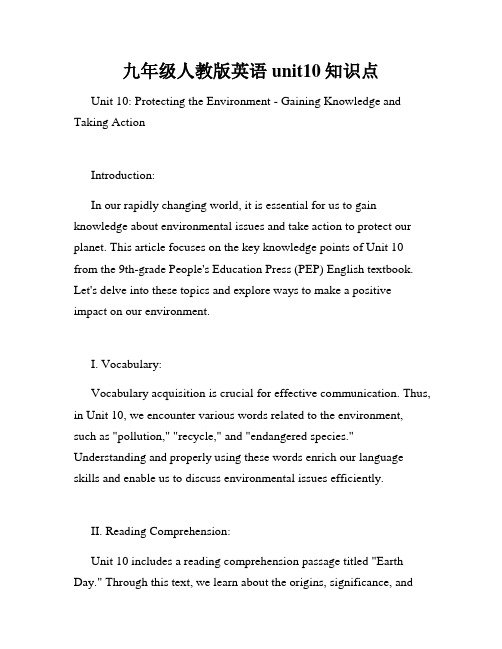
九年级人教版英语unit10知识点Unit 10: Protecting the Environment - Gaining Knowledge and Taking ActionIntroduction:In our rapidly changing world, it is essential for us to gain knowledge about environmental issues and take action to protect our planet. This article focuses on the key knowledge points of Unit 10 from the 9th-grade People's Education Press (PEP) English textbook. Let's delve into these topics and explore ways to make a positive impact on our environment.I. Vocabulary:Vocabulary acquisition is crucial for effective communication. Thus, in Unit 10, we encounter various words related to the environment, such as "pollution," "recycle," and "endangered species." Understanding and properly using these words enrich our language skills and enable us to discuss environmental issues efficiently.II. Reading Comprehension:Unit 10 includes a reading comprehension passage titled "Earth Day." Through this text, we learn about the origins, significance, andactivities associated with Earth Day. This passage emphasizes the importance of this annual event in raising awareness and encouraging environmental action. By comprehending and analyzing such texts, we gain insight into environmental campaigns and learn how to protect and preserve our surroundings.III. Listening Skills:Listening comprehensively is a vital component of language learning. In Unit 10, we improve our listening skills by engaging with audio materials related to protecting the environment. By actively listening and responding to dialogues and monologues, we can better understand environmental problems and solutions, such as reducing carbon emissions, conserving water, and promoting clean energy.IV. Grammar:Proper grammar usage enables us to express our ideas accurately. In this unit, we focus on learning the present perfect tense, which helps us discuss past actions and their ongoing relevance to the present. This tense is particularly useful when discussing environmental issues, as it allows us to link past actions to current consequences and motivate us to take action to rectify the damage caused.V. Writing Skills:Writing is a powerful tool for expressing our thoughts and ideas. In Unit 10, we hone our writing skills by composing environmentally focused essays, letters, and speeches. By organizing our thoughts and presenting them coherently, we can effectively convey the importance of environmental protection and inspire others to join us in making a positive impact.VI. Speaking Practice:Effective verbal communication is essential in conveying messages and ideas. Unit 10 provides opportunities for us to practice speaking skills through group discussions, role-plays, and presentations centered around environmental issues. By participating actively and sharing our opinions, we not only improve our speaking abilities but also learn to collaborate with others in finding sustainable solutions.Conclusion:Unit 10 of the 9th-grade PEP English textbook offers valuable knowledge and skills related to environmental protection. By acquiring a robust vocabulary, honing our reading comprehension, listening, grammar, writing, and speaking abilities, we become better equipped to address environmental challenges. Let us apply this knowledge in our daily lives and take responsibility for protecting our planet, ensuring a sustainable future for generations to come.。
人教版英语九年级unit10知识点
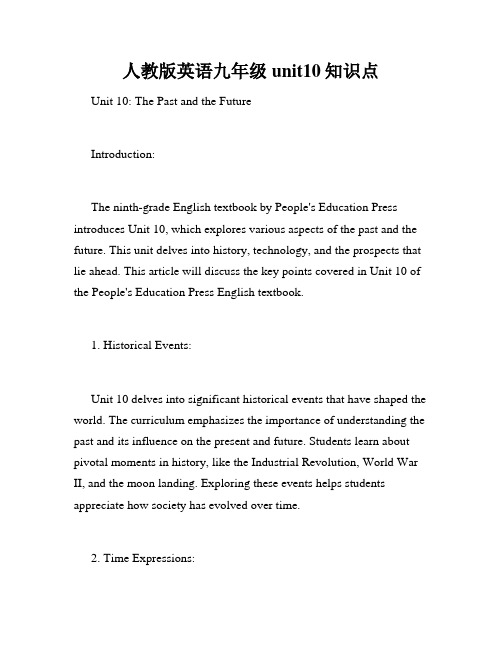
人教版英语九年级unit10知识点Unit 10: The Past and the FutureIntroduction:The ninth-grade English textbook by People's Education Press introduces Unit 10, which explores various aspects of the past and the future. This unit delves into history, technology, and the prospects that lie ahead. This article will discuss the key points covered in Unit 10 of the People's Education Press English textbook.1. Historical Events:Unit 10 delves into significant historical events that have shaped the world. The curriculum emphasizes the importance of understanding the past and its influence on the present and future. Students learn about pivotal moments in history, like the Industrial Revolution, World War II, and the moon landing. Exploring these events helps students appreciate how society has evolved over time.2. Time Expressions:A crucial part of learning any language is understanding how to express time accurately. Unit 10 of the textbook introduces various time expressions, such as "in the past," "in the future," "just now," and "for a long time." Students learn how to use these expressions in sentences, allowing them to effectively communicate their thoughts and experiences regarding time frames.3. The Tenses:Unit 10 revisits and expands upon the study of tenses. The past, present, and future tenses are explored in greater detail. Students learn how to construct sentences in each tense, helping them become more proficient in expressing themselves accurately. Additionally, they learn about the differences between simple, continuous, and perfect tenses, enhancing their understanding of English grammar.4. Technological Advances:The modern world is heavily influenced by technological advancements. Unit 10 focuses on significant technological achievements throughout history and predictions about the future. Students study revolutionary developments such as the invention of thetelephone, the internet, and artificial intelligence. They also speculate on future technologies, examining possibilities like virtual reality and renewable energy sources.5. Conditional Sentences:Conditional sentences are essential for expressing hypothetical situations or outcomes. Unit 10 introduces various types of conditionals, including zero, first, second, and third conditionals. Students learn how to construct these sentences accurately and use them to express their thoughts about past and future possibilities. Mastering conditional sentences enhances their language skills and enables them to communicate complex ideas effectively.6. The Past and Future in Literature:Literature often explores themes related to the past and future. In Unit 10, students are exposed to famous works of literature that touch upon these themes. They read excerpts from classic novels and poems and analyze the authors' perspectives on time and historical events. This exercise not only fosters language skills but also cultivates critical thinking and literary appreciation.Conclusion:Unit 10 of the People's Education Press English textbook provides ninth-grade students with a comprehensive understanding of various aspects related to the past and the future. From historical events to time expressions, tenses, technological advances, and literature, this unit introduces valuable knowledge and language skills. By studying these topics, students can develop a broader perspective on the world and enhance their language proficiency.。
九年级人教英语unit10知识点

九年级人教英语unit10知识点Unit 10 Knowledge Points in 9th Grade People’s Education EnglishAs we approach the end of the school year, it's important to revise and consolidate the knowledge we have gained throughout the academic term. In this article, we will delve into the key concepts and skills covered in Unit 10 of the 9th Grade People's Education English curriculum. Let's explore these points in detail.1. Expressions and Phrases:Unit 10 introduces a variety of useful expressions and phrases related to studying and learning. Students learn how to describe their preferences, opinions, and experiences. Some examples include "I prefer studying alone," "In my opinion," and "I have had the pleasure of attending many interesting lectures." These phrases not only enhance their vocabulary but also help them to express themselves more effectively in different situations.2. Passive Voice:Unit 10 focuses on the usage and understanding of the passive voice. Students learn how to form passive voice sentences, understand the difference between active and passive voice, and gain insight into whenit is appropriate to use each. Passive voice sentences are often used in academic writing or when the subject is not essential to the meaning of the sentence. For example, "The book was written by a famous author" or "The decision was made by the committee." This knowledge enables students to construct more nuanced and sophisticated sentences.3. Reading Comprehension:Unit 10 provides students with a variety of reading materials to enhance their reading comprehension skills. Through different texts, students learn to identify main ideas, make inferences, and draw conclusions. They also practice decoding new vocabulary within context, improving their overall language proficiency. Reading comprehension is an essential skill that students will continue to develop throughout their academic journey and in their everyday lives.4. Writing Skills:Unit 10 includes lessons on different writing genres, such as emails, opinions, and letters. Students learn how to structure their writing effectively, including proper greetings and closing phrases, appropriate paragraphing, and clear and concise expressions of ideas. They also focus on using appropriate register and tone for different audiences and purposes. These writing skills will equip students with the ability to communicate effectively both academically and professionally.5. Grammar Review:Unit 10 offers a comprehensive review of various grammar concepts previously taught. Students revisit topics such as the past simple tense, modals, comparative and superlative forms, adverbial clauses of time, and relative clauses. This review helps students reinforce their understanding, correct any misunderstandings, and apply these grammar concepts accurately in their spoken and written language.In conclusion, Unit 10 of the 9th Grade People's Education English curriculum covers a wide range of knowledge points that are essential for students' language development. From improving their vocabulary and expressions to enhancing their reading comprehension and writing skills, this unit provides a solid foundation for their English language proficiency. By mastering these concepts and skills, students will be better equipped to face future challenges in their academic and professional lives.。
新人教版九年级英语unit10知识点归纳

新人教版九年级英语unit10知识点归纳Unit 10: The Mystery of the RainforestIntroductionUnit 10 of the New Edition Grade 9 English textbook takes us on a fascinating journey into the heart of the rainforest. This unit is packed with knowledge about the biodiversity, environmental conservation, and the significance of the rainforest ecosystem. Let's dive in and explore the rich content of Unit 10.The Importance of RainforestsRainforests are incredibly vital to the health of our planet. They help to regulate the global climate, provide a home to countless species, and offer numerous resources for human beings. The rainforests act as the "lungs of the Earth," absorbing carbon dioxide and releasing oxygen into the atmosphere. Moreover, they are a source of medicinal plants and play a crucial role in maintaining the water cycle. Without rainforests, our planet would suffer from the adverse effects of climate change, loss of biodiversity, and disrupted ecological balance.Biodiversity in the RainforestThe rainforest is a treasure trove of biodiversity. It is estimated that around 50% of the world's plants and animal species call the rainforest their home. This incredible variety of life forms plays a vital role in maintaining the health and resilience of the ecosystem. The diverse array of plants and trees create a complex web of ecological relationships, contributing to the stability of the rainforest. It is essential for us to understand the value of preserving biodiversity and take steps to protect these fragile ecosystems.Threats to the RainforestUnfortunately, rainforests face numerous threats. Deforestation is one of the primary concerns plaguing these ecosystems. Trees are cut down to clear land for agriculture, logging, and urbanization, leading to habitat loss and an irreversible impact on biodiversity. Additionally, illegal hunting and the unsustainable extraction of resources are rapidly depleting the delicate balance of the rainforest. It is crucial for governments, organizations, and individuals to come together and implement sustainable practices for the preservation of these valuable ecosystems.Conservation EffortsVarious organizations and initiatives have been working tirelesslyto conserve rainforests. One example is the establishment of national parks and protected areas, where human activities are strictly regulated to minimize the impact on the ecosystem. Sustainable forestry practices, such as selective cutting and reforestation, are being promoted to curb deforestation. Additionally, raising awareness about the importance of rainforest conservation among local communities and the global population is essential in fostering a sense of responsibility and inspiring action.The Role of Education in Rainforest ConservationEducation plays a critical role in rainforest conservation. By teaching students about the significance of rainforests, you equip them with the knowledge and understanding required to take action. Educating young minds about the complexity of rainforest ecosystems, the importance of biodiversity, and the consequences of deforestation instills a sense of responsibility and empowers them to make informed decisions that benefit the environment. Education is a powerful tool that can inspire the next generation to protect and preserve our precious rainforests.ConclusionUnit 10 of the New Edition Grade 9 English textbook offers profound insights into the fascinating world of rainforests. It illustrates the importance of rainforests in sustaining life on Earth, the threats they face, and the urgent need for their conservation. By immersing ourselves in the knowledge contained within this unit, we gain a deeper understanding of the significance of rainforests and are equipped to become advocates for their protection. Let us embrace this knowledge and take action to ensure the future of these incredible ecosystems for generations to come.。
人教版九年级英语unit10复习汇总
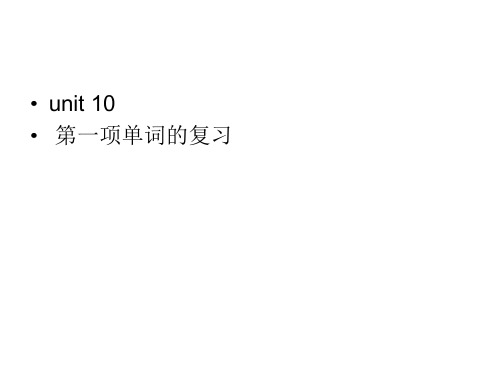
as I held out my hand, he bowed. Katie : That’s how people in Japan are expected to greet each other. It’s impolite if you don’t bow. John: I didn’t know that. So I just stood there with
Dear Laura,
Thanks for your message. Yes, I’m having a great time on my student exchange program in France. I was a bit nervous before I arrived here, but there was no reason to be. My host family is really nice. They go out of their way to make me feel at home. The grandmother knows that I miss Chinese food a lot. So she actually learned how to make Chinese food! She also has a teenage granddaughter about my age who is really kind. She always talks to me in French to help me practice. You wouldn’t believe how quickly my French has
人教版九年级英语Unit10知识点复习

人教版九年级英语Unit10知识点复习一、短语&句子1. for the first time___________2. shake hands with sb_________________3.as soon as _______________我一伸出手去,他就鞠躬。
___________________________________________她一来我就会告诉他这个好消息。
_____________________________________4. 我只是伸着手站在那里。
最后我还礼了。
I just stood there______________. Finally, I ____________a bow.5. 令我惊讶的是,他亲吻了我的双颊。
_______________, he killed me on both sides of my face.6. find out ______________7. 在我们那个地方,我们的时间观念比较随意。
Where I’m from, we______________________time.8. 珍惜时间_______________________9. 如果有时间,我们经常顺便到朋友的家里拜访。
We often just ____________our friends’ home if we have time.顺便拜访某人________________________顺便拜访某地___________________10. 我们经常只是在城镇中心走走,尽可能地多件很多朋友。
We often just walk around the town center,_____________________. 尽可能多的去学习这些习俗是有帮助的。
It is helpful to learn_______________________________.11. on time___________________in time_____________________12. after all__________________13. 邀请某人去做某事_____________________邀请某人去某地__________________________14. get mad_________________; make an effort to do sth______________________15. 避免交通拥挤___________________traffic16. 而且,我们也从不事先未打电话便登门拜访朋友。
- 1、下载文档前请自行甄别文档内容的完整性,平台不提供额外的编辑、内容补充、找答案等附加服务。
- 2、"仅部分预览"的文档,不可在线预览部分如存在完整性等问题,可反馈申请退款(可完整预览的文档不适用该条件!)。
- 3、如文档侵犯您的权益,请联系客服反馈,我们会尽快为您处理(人工客服工作时间:9:00-18:30)。
Unit 10 You are supposed to shake hands.一、短语 &句子1.for the first time___________2.shake hands with sb_________________3.as soon as _______________我一伸出手去,他就鞠躬。
___________________________________________她一来我就会告诉他这个好消息。
_____________________________________4.我只是伸着手站在那里。
最后我还礼了。
I just stood there______________. Finally, I ____________abow.5.令我惊讶的是,他亲吻了我的双颊。
_______________, he killed me on both sides of my face.6.find out ______________7.在我们那个地方,我们的时间观念比较随意。
Where I ’m from, we______________________time.8.珍惜时间 _______________________9.如果有时间,我们经常顺便到朋友的家里拜访。
Weoften just ____________our friends’ home if we have time. 顺便拜访某人 ________________________顺便拜访某地 ___________________10.我们经常只是在城镇中心走走,尽可能地多件很多朋友。
We often just walk around the towncenter,_____________________.尽可能多的去学习这些习俗是有帮助的。
It is helpful to learn_______________________________.11.on time___________________in time_____________________12.after all__________________13.邀请某人去做某事 _____________________邀请某人去某地 __________________________14. get mad_________________; make an effort to do sth______________________15.避免交通拥挤 ___________________traffic16.而且,我们也从不事先未打 xx 便登门拜访朋友。
Also, we _________visit a friend’s home___________________.17.It ’s a big deal!_________________________18.make sb feel at home___________________19.show up______________ ;look forward to_______________20.交朋友 ______________二、语法点1. be supposed to sth应该做某事应该做某事 ==should/ought to do sth;否定:在be动词后+not ①be supposed to 的主语是人时,意为“应该,被期望”,用来表示劝告,建议,义务,责任等,相当于情态动词 shouldWhenwere you supposed to arrive? I was supposed to arriveat 9:30 p.m.②be supposed t to的主语是物时,意为本应,本该,用来表示某事本应该发生而没发生。
Sports meeting was supposed to be held on Monday, but we hadto put it off because of bad weather.运动会应该在周一举行,但由于天气不好我们不得不推迟。
③was/were supposed to do sth相当于should have done sth表示过去本应该做某事而实际上并没有做You were suposed to arrive here at 6.④be supposed to还可用于表示“被认为被相信是...”He is supposed to be very rich.他被认为很富有。
The whole building is supposed to belong to Mr.Smith.2. be expected to do sth应该做某事,被期望做某事In the United States, they’re expected to shake hands.3. It+be+adj+(for/of )+sb + to do sth...It is/was important/possible/necessary/dangerous/easy +for sb to do sth..It is possible for us to finish the project tomorrow.It is/was kind/nice/clever/rude/helpful/polite+of sb to do sth,It was rude of you to talk back to your parents.find/make/feel...+it+adj+to do sthI found it hard to plete the task on time.1. Your shoes are too dirty. You’d better_____.A. put on themB. put them onC. take off themD. takethem off2.I used to ___up at six, but I get used to_______up athalf past six now.A. get, getB.getting, gtC. get, gettingD. getting3. It’s all right if you e ______late.A. a bit ofB. a little ofC. a littleD. getting, too much4.Yesterday we all went to visit the Great Wall_______Jenny, because she was ill in hospital.A. besidesB. except forC. withD. except 5.Without____a word, the man left in a hurry. A.saying B. says C. said D. to say6. They go out of their way_______at homes.A. make me feelB. to make me feelingC. to make me feelD. making me feel7. Henry will give us a report as soon as he________.A. arrivesB.arrivedC.is arrivingD.will arrive8.–Do you mind if I take some photos here?--______. Look at the sign“ No photos!”A. CertainlyB.You’d better notC. Yes, you can.D. Thanks, you can.9.–Nick, would you mind_____out of the bathroom?--Sorry. I won’t be long.A. eB. to eC. ing10.–I’m sorry. I didn’t pass the math exam.--Never mind. You have tried your best________.A. after allB.in allC.at allD.first of all11.If you want to improve your spoken English, you shouldpractice it____you can.A. as many asB. as much asC. as soon asD. asquickly as12.–Who’s the boy in white T-shirt______under the tree?--My friend.13.The Greens used to live in London and nowthey______in Beijing.A. used to liveB. are used to livingC. are used to living D are used for living14.My pen pal Andrew found it difficult_____Chinese well.A. learningB. learnC. to learnD. learned15. My parents _____gettng up early on weekdays.A. used toB. be used toC. was used toD. are usedto16.Don ’t ask him to study too late into the night._______, he is only a small child.A. As a resultB. After allC. Best of allD. For example。
